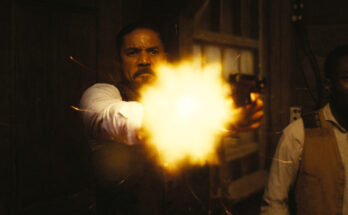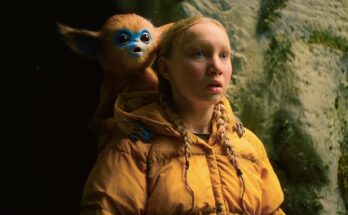Want to hear more from the actors and creators of your favorite shows and films? Subscribe to The Cinema Spot on YouTube for all of our upcoming interviews!
Managing editor & film and television critic with a Bachelor's of Arts in English Literature with a Writing Minor from the University of Guam. Currently in graduate school completing a Master's in English Literature.
Following the releases of her father David Cronenberg’s Crimes of the Future in 2022 and her brother Brandon Cronenberg’s Infinity Pool last year, Caitlin Cronenberg joins the family business of filmmaking with her first directorial feature debut, Humane. This horror thriller is a response to events transpiring around the globe today, and its plot centered in a single location setting posited into a world built with a crisis at large makes for a conflict-driven narrative that is all too relatable for everyone. While Cronenberg’s film is unlike the body horror stories associated with the family name, Humane is a fascinating filmmaking feat focused on ecological matters both at the macro and micro levels.
Humane is written by producer Michael Sparaga and is directed by Cronenberg.
In this review, I will discuss Caitlin Cronenberg and Michael Sparaga’s Humane. As this article’s title suggests, no spoilers will be present.
Humane Synopsis
According to IFC Films and Shudder Press, here is the logline for Caitlin Cronenberg’s Humane.
HUMANE takes place over a single day, mere months after a global ecological collapse has forced world leaders to take extreme measures to reduce the earth’s population. In a wealthy enclave, a recently retired newsman has invited his four grown children to dinner to announce his intentions to enlist in the nation’s new euthanasia program. But when the father’s plan goes horribly awry, tensions flare and chaos erupt among his children.
IFC Films Press
Discussion
The past decade or so has provided modern audiences and fans of the horror genre with films that specifically critique or focus primarily on the upper-class white demographic. The Purge, Ready or Not, and The Menu are a few examples that come to mind, and Cronenberg’s Humane more or less meets these standards. Upon first viewing, the film looks as if it is the usual B-movie on streaming. It is not what audiences would call “one of the worst”, neither is it average nor is it pristine by any means. However, the film feels greater on a second watch. The young filmmaker and her team allow events to unfold with a clear structure.
Music composer Todor Kobakov’s soundtrack for Humane has some wicked good themes. More so, what music supervisor Cody Partridge does right is including Trooper’s “We’re Here for a Good Time (Not a Long Time)” in the film’s opening. It introduces the plot and its conflict to resolve overpopulation. The song paired with the contradicting concept of volunteered euthanization is a combination that strikes an interesting point. By building a world around this concept, Cronenberg and Sparaga illustrate the anxieties of rushing time, that Death literally comes knocking at one’s door with a fixed schedule in mind.
At a smaller level, the storytellers offer a dilemma within volunteering for euthanasia on the clock. The York family members are each their own individual people, with costume designer Hanna Puley showcasing the characters as dressed according to their backgrounds. One child studies the science of human beings, and another is a CEO of therapeutics. One child is finding their place in the puzzle of home, while another is a struggling artist… so then, to quote Marvin Gaye, what’s going on?
Shudder at the Crumbling of the Ecology
The story itself is a hit or a miss, especially with how its writing lands its short body count. However, Cronenberg and Sparaga seem more concerned with pushing forward the world’s issues, whether on a global scale or a personal one. Precisely, they sprinkle in the effects of the global crisis without truly answering what caused it insofar that these effects reflect those in our own world. The effects are not elaborated on, and that could be a fine route to take. For instance, Humane‘s opening scene insinuates that the dwindling of natural resources will impact everyone, including the rich. Accessing things such as fresh fruit and meat may be hard to come by in the decades, maybe years, to come. God forbid, it would be interesting to see a reality in which we must respond to such an outcome.
The film also briefly highlights anti-Asian crimes as a response to the crisis. Unfortunately, this is something that happens in the world today. Individuals with clear roots in Asia have been attacked and even murdered no matter their age. Thankfully, Humane does not show how severe the harsh treatment of this demographic is and instead just tells characters and viewers that matters have happened in the background.
Cronenberg and Sparaga even emphasize both the censorship of those who speak out against the government as well as the blackmail of those refusing to volunteer for euthanization by publicizing personal data. Social media platforms have encountered these problems in the past few years, and they will only worsen unless proper resolutions can be made. That is the reality of smartphones. In the world we reside in today, the truth is captured through photographs and video recordings, so it is best to take advantage of that whenever possible.
A Domesticity of Relations
What hits close to home about Humane is what is not seen on-screen. Although, the narrative also demonstrates the threats to a person’s Eigenwelt, or self-sphere. In dissecting the York family by their individual milieus, viewers can take note of how the conflict escalates itself. Everyone loses their ways of life if they do not adhere, and I honestly believe that the family member who is morally the worst deserves death over others.
In a smaller B-plot, Department of Citizen Strategy (D.O.C.S.). procedure practitioner Bob (Enrico Colantoni) and York grandchild Mia (Sirena Gulamgaus) exchange dialogue about which generation possesses better living conditions. This is a topic of conversation that I see older people engaging with in passing or on social media. However, it would be remiss of me to simply call it trite. Rather, what this dialogue appears to highlight is how certain people react to differing means of achieving answers. Just because one household, group, or generation lived a certain way does not mean it should be the same for the next.
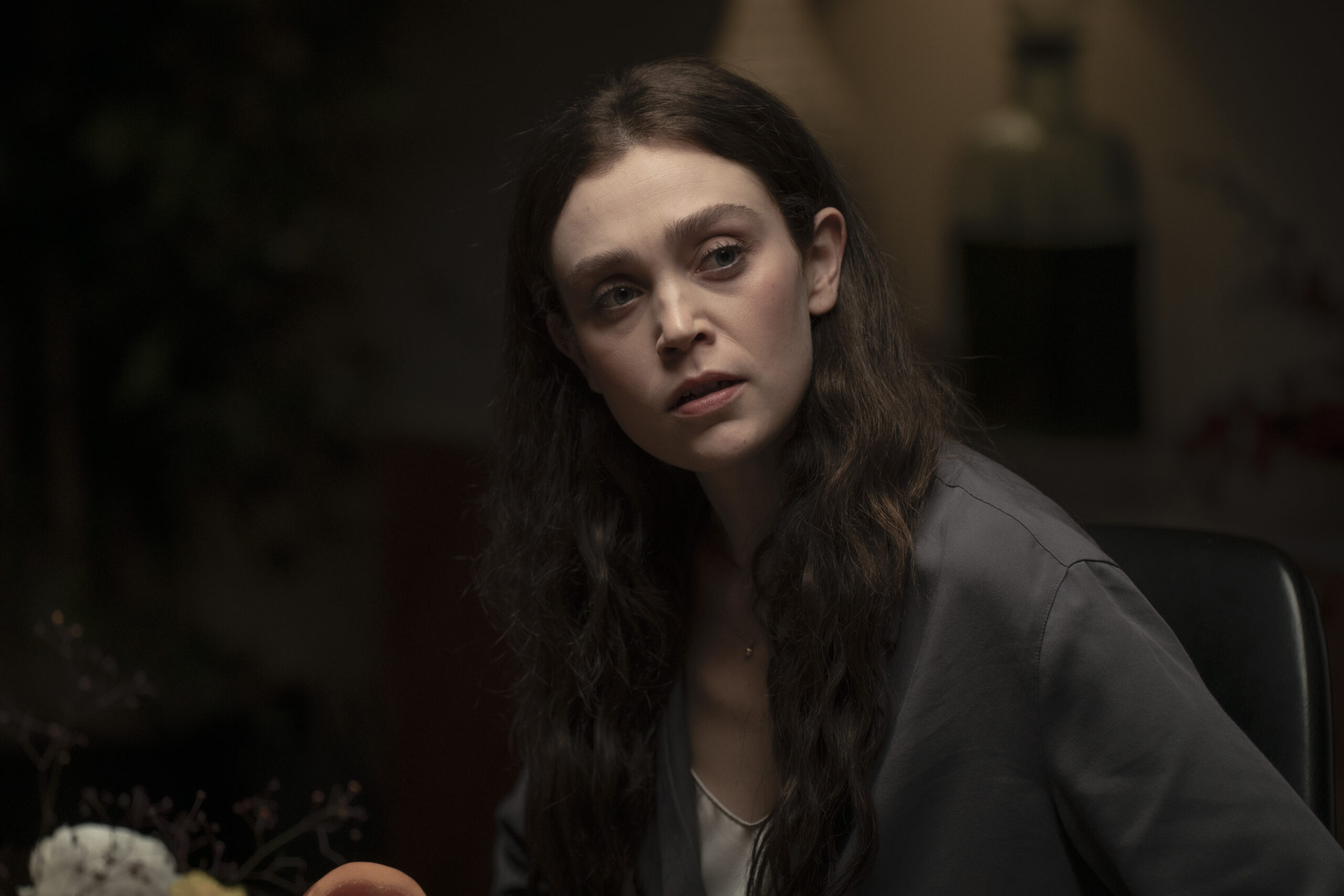
The Crew Behind Humane
Douglas Koch serves as the director of photography. Robin Cymbaly and Steve Wilkie are the stills photographers.
Orlee Buium serves as the editor for the film. Curt Lobb does additional editing.
Todor Kobakov composes the music for the film’s score. Cody Partridge serves as the music supervisor.
John Loranger (The Shannara Chronicles, Netflix’s Wednesday) is the supervising sound editor. Dan Sexton is the sound effects editor.
Deirdre Bowen (The Dead Zone, The Fly, Dead Ringers, Crash, Hobo with a Shotgun, Antiviral, Cosmopolis, Enemy, Possessor, Kim’s Convenience, Crimes of the Future, Infinity Pool) serves as the casting director.
Christopher Richards (Hobo with a Shotgun, Antiviral, Enemy, Possessor) is the casting associate.
James Binkley serves as the film’s stunt coordinator.
Steve Gagne serves as the Jared York stunt double. Christine Cleary serves as the Rachel stunt double. Spencer Birman serves as the Noah stunt double. Afton Rentz serves as the Ashley stunt double.
Brian Garvey serves as the production designer. Andrea Perez-Leon serves as the art director.
Hanna Puley is the costume designer.
Leanne Morrison-Freed is the head of the hair department. Rachel Affolter is the head of makeup. Ashley Irwin is the key makeup artist.
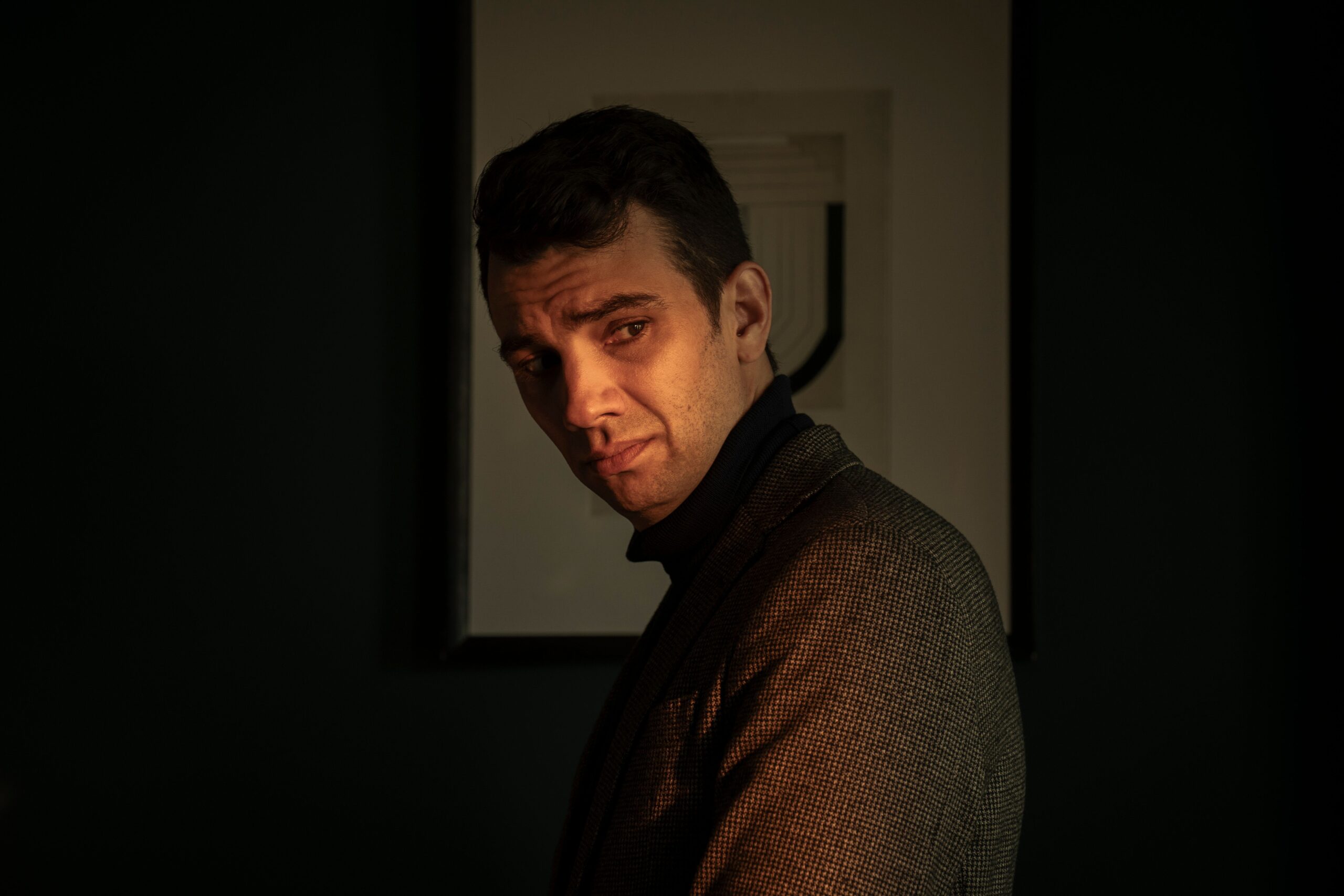
The Cast of Humane
Peter Gallagher portrays Charles York, the patriarch of the York family. Uni Park plays Dawn Kim, Charles’s second wife.
Jay Baruchel portrays Jared York, an anthropology professor and the eldest child of the York family. Emily Hampshire (12 Monkeys, Mother!, Schitt’s Creek) portrays Rachel, the older daughter of the York family and the CEO of York Therapeutics.
Sebastian Chacon plays Noah York, the adopted son of the York family and a recovering junkie. Alanna Bale portrays Ashley York, the youngest child of the York family and a failed actress.
Sirena Gulamgaus plays Mia York, Rachel’s daughter. Enrico Colantoni portrays Bob, a procedure practitioner from the Department of Citizen Strategy (D.O.C.S.).
Martin Roach plays Tony, Bob’s colleague at D.O.C.S.
Blessing Adedijo plays Grace Dawson, Noah’s girlfriend. Dani Kind voices Beth, Jared’s ex-wife.
Franckie Francois and Joel Gagne play Malik and Yusef, both piano movers, respectively.
Yanna McIntosh plays a political commentator. David Cronenberg (Jason X) appears as the D.O.C.S. commercials narrator.
Payne Novak appears as Lucas, Jared’s son.
Lisa Berry voices a newscaster. Colm Feore (Face/Off, Marvel Studios’ Thor, The Amazing Spider-Man 2, Netflix’s The Umbrella Academy) voices the Secretary-General of the United Nations.
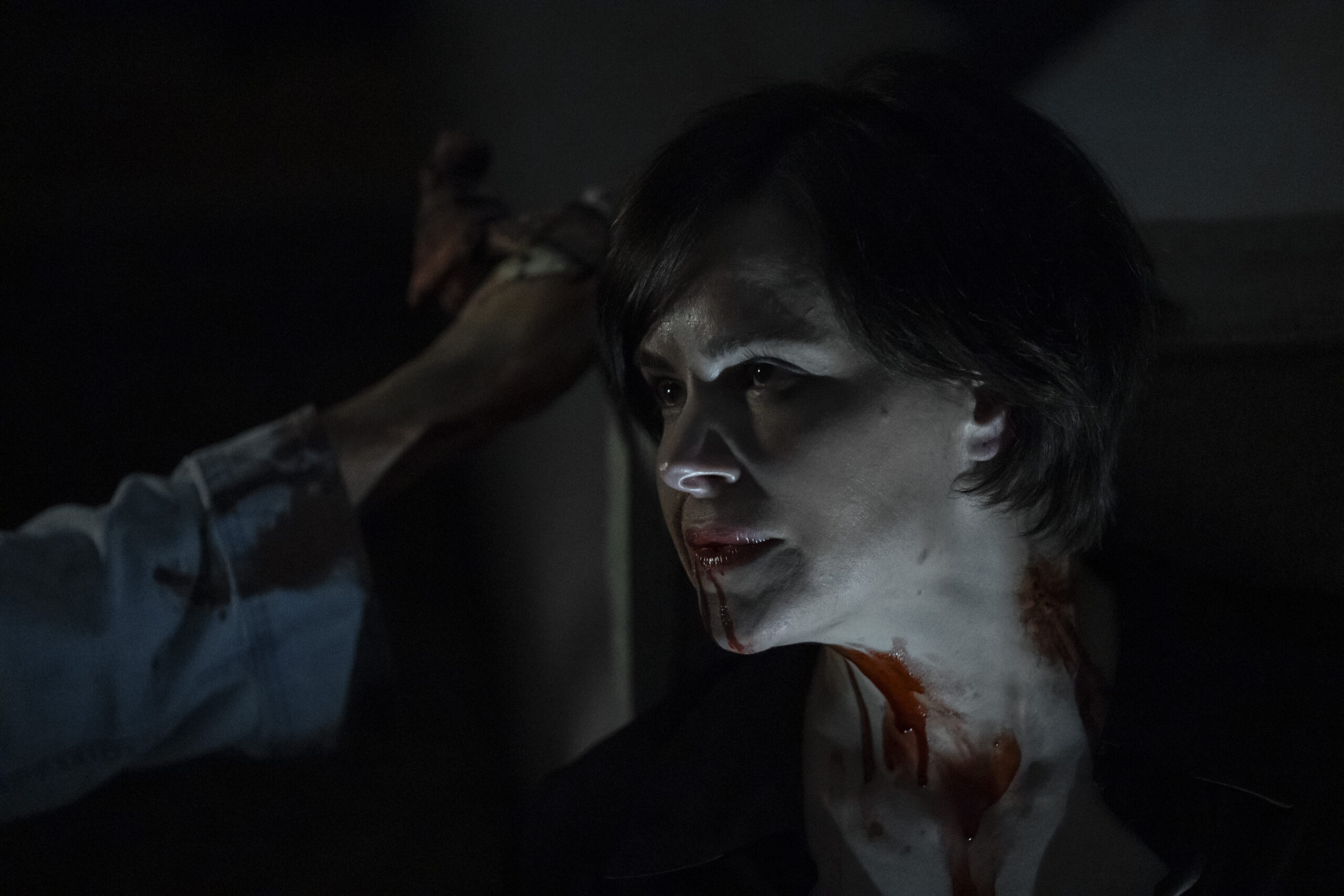
Performances and Character Developments
Gallagher undoubtedly steals the first act with his delivery and his mannerisms as the York patriarch. Charles York is not just any fatherly figure; he comes off as sweet, understanding, and unwilling to give up on what needs to be done. The character has near-brilliant scenes with his children, whether he is asserting dominance over a daughter who speaks out or offering comfort to another child who shows their personal growth. He does not get enough time to be this type of role model that I admire, but it is nice to see nonetheless.
For an antagonistic character named Bob, most viewers might not pay him much attention. However, Colantoni appears as if he is the Horseman of Death wearing that white one-piece uniform. The actor has a menacing performance in his role that I believe should not be underestimated. Bob does not wield a scythe, but he portrays the personification of Death fairly. He plays his cards because that is his job, but he also takes pleasure in control. This may be a reason why he juxtaposes with Charles York so subtly. He is not a person who brings the family together. Instead, he tears them apart from the outside, and that is nothing but trouble.
While all four of the York children are interestingly written, Ashley York (Alanna Bale) grabs my attention over the others. Her Mitwelt (or professional sphere) of ecology is what drives her as a character. She is a failure as a person, even more than her adoptive brother, and it is evident in the specific choices that she makes. I will leave it at that so as to not spoil the fate of her family tree.
Final Thoughts on Caitlin Cronenberg and Michael Sparaga’s Humane
Humane is not perfect from a filmmaking standpoint, by any means. Although, from the perspective of its screenplay, Caitlin Cronenberg and Michael Sparaga almost satirize the modern world as we know it. What makes it a horror film lies in the horror of truth, which is that more people are dying than one would come to realize. There is no way to run from that truth because it can happen under the roof of your own home at any given hour. This film is about how we aim to combat multiple problems thrown our way and how these resolutions could be available to more people. If audiences are not appreciating it now, then I can only hope it will receive a stronger reception once it hits Shudder.
4/5 stars
Caitlin Cronenberg and Michael Sparaga’s Humane is now playing in theaters and will stream via Shudder on July 26th!
Have you seen the film in theaters? If so, then what are your thoughts on it? Let us know! For more horror and thriller-related news and reviews, follow The Cinema Spot on Facebook, Twitter, and Instagram!
Managing editor & film and television critic with a Bachelor's of Arts in English Literature with a Writing Minor from the University of Guam. Currently in graduate school completing a Master's in English Literature.


